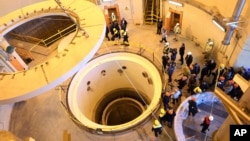US Middle East envoy Steve Witkoff declared that the Donald Trump administration's "red line" in the nuclear talks with Iran is Tehran's ability to enrich uranium at any level, prompting Iran to say it will continue enrichment "with or without a deal."
"We cannot allow even 1 percent of an enrichment capability," Witkoff told ABC on May 18, insisting any enrichment, even for civilian purposes, could enable weaponization.
"Everything begins…with a deal that does not include enrichment…because enrichment enables weaponization. And we will not allow a bomb to get here," he said.
Iranian Foreign Minister Abbas Araqchi quickly rejected Witkoff's demand, calling it unrealistic and disconnected from the realities of the negotiations.
"Enrichment in Iran will continue with or without a deal," Araghchi posted on X, emphasizing that Iran's right to enrichment is non-negotiable as a signatory to the Non-Proliferation Treaty (NPT).
He added, "If the [United States] is interested in ensuring that Iran will not have nuclear weapons, a deal is within reach, and we are ready for a serious conversation to achieve a solution that will forever ensure that outcome."
Araqchi criticized what he described as inconsistent US messaging in public and attributed comments about zero enrichment to the Trump's administration attempt to pacify "special interest groups," which he described as "malign actors."
Amid the standoff, Kamal Kharrazi, senior adviser to Supreme Leader Ayatollah Ali Khamenei, reinforced Iran's position on enrichment during an annual gathering in the Iranian capital on May 18.
He described Iran's nuclear knowledge as "irreversible," adding that Iran does not seek nuclear weapons but regional nuclear disarmament should be a shared goal.
Kharrazi has previously warned that while Iran may not be looking to acquire nuclear weapons, it can make a bomb and "may reconsider its nuclear doctrine if faced with an existential threat."
Witkoff and Araqchi have meet directly and indirectly in four rounds of nuclear talks mediated by Oman, but no date has been set for a fifth round. Some reports say the next meeting may be held over the coming weekend.
Trump last week said Washington was "getting closer" to a deal with Tehran and urged the Islamic republic to "move quickly" on a US proposal over its nuclear program. Araqchi, however, insisted that Iran had not received a "written" proposal.
"They have a proposal. More importantly, they know they have to move quickly or something bad -- something bad is going to happen," Trump said.
Hossein Aghaie, a security analyst based in Turkey, said Trump's warning serves as an "unwritten ultimatum" but added that the US president appears "very optimistic" about being able to get a deal with Tehran solely through diplomacy that meets US demands, such as abandoning enrichment and scaling back regional activities.
"Trump is insisting on diplomacy and is very optimistic that diplomacy will bear results desired by the United States," he told RFE/RL's Radio Farda.
"Unless the United States relents on its maximalist demands, it cannot get what it wants simply through diplomacy alone," he said.
Trump has threatened military action against Iranian nuclear facilities if the two countries fail to reach a deal. Tehran, however, has warned that it will retaliate if struck.











